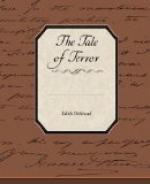“It is true that the English in general, and indeed most of the men of learning in Europe, have given up all accounts of witches and apparitions, as mere old wives’ fables. I am sorry for it; and I willingly take this opportunity of entering my solemn protest against this violent compliment which so many that believe the Bible pay to those who do not believe it.”
The Cock Lane ghost gained very general credit, and was considered by Mrs. Nickleby a personage of some importance, when she boasted to Miss La Creevy that her great-grandfather went to school with him—or her grandmother with the Thirsty Woman of Tutbury. The appearance of Lord Lyttleton’s ghost in 1779 was described by Dr. Johnson, who was also disposed to believe in the Cock Lane ghost, as the most extraordinary thing that had happened in his day.[5] There is abundant evidence that the people of the eighteenth century were extremely credulous, yet, in literature, there is a tendency to look askance at the supernatural as at something wild and barbaric. Such ghosts as presume to steal into poetry are amazingly tame, and even elegant, in their speech and deportment. In Mallet’s William and Margaret (1759). which was founded on a scrap of an old ballad out of The Knight of the Burning Pestle, Margaret’s wraith rebukes her false lover in a long and dignified oration. But spirits were shy of appearing in an age when they were more likely to be received with banter than with dread. Dr. Johnson expresses the attitude of his age when, in referring to Gray’s poem, The Bard, he remarks:
“To select a singular event and swell it to a giant’s bulk by fabulous appendages of spectres and predictions has little difficulty, for he that forsakes the probable may always find the marvellous. And it has little use; we are affected only as we believe; we are improved only as we find something to be imitated or declined.” (1780.)
The dictum that we are affected only as we believe is open to grave doubt. We are often thrown into a state of trepidation simply through the power of the imagination. We are wise after the event, like Partridge at the play:
“No, no, sir; ghosts don’t appear in such dresses as that neither... And if it was really a ghost, it could do one no harm at such a distance, and in so much company; and yet, if I was frightened, I am not the only person."[6]
The supernatural which persisted always in legends handed down from one generation to another on the lips of living people, had not lost its power to thrill and alarm, and gradually worked its way back into literature. Although Gray and Collins do not venture far beyond the bounds of the natural, they were in sympathy with the popular feelings of superstitious terror, and realised how effective they would be in poetry.
Collins, in his Ode on the Superstitions of the Scottish Highlands, adjures Home, the author of Douglas, to sing:




